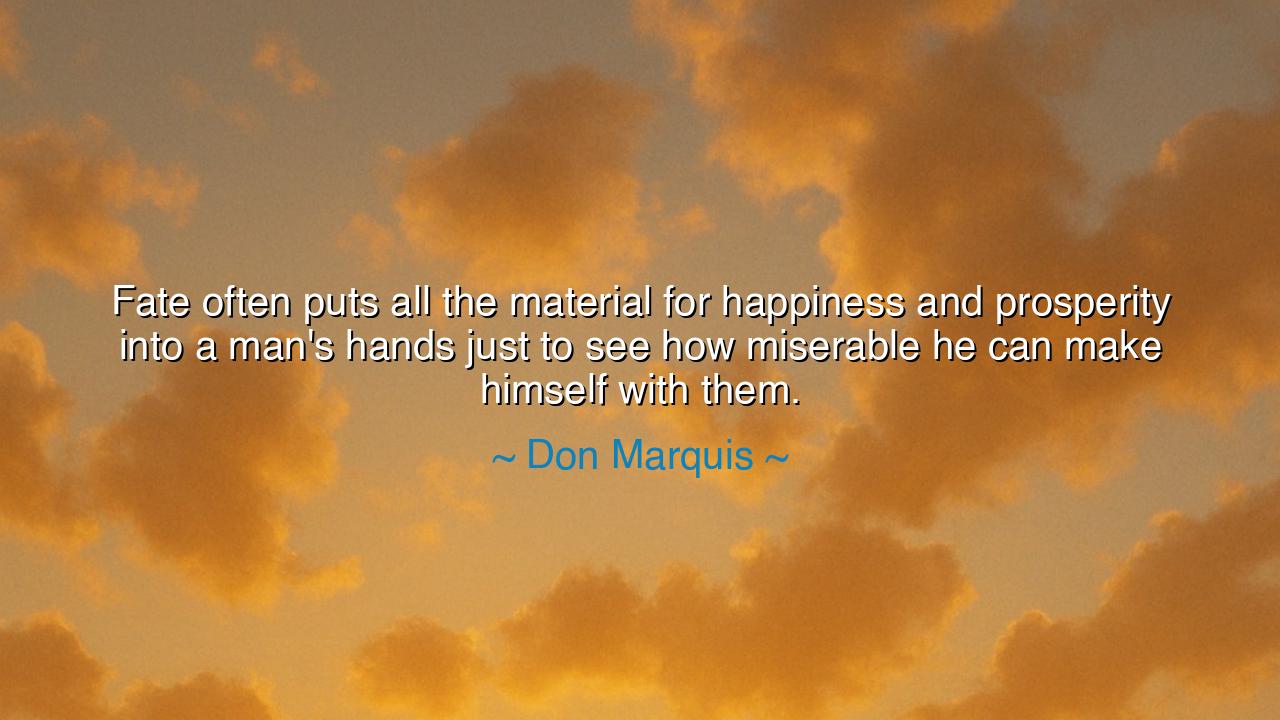
Fate often puts all the material for happiness and prosperity
Fate often puts all the material for happiness and prosperity into a man's hands just to see how miserable he can make himself with them.






“Fate often puts all the material for happiness and prosperity into a man's hands just to see how miserable he can make himself with them.” — Thus spoke Don Marquis, with the irony and insight of one who had seen the strange theater of human life. His words pierce like an arrow of truth wrapped in jest, for they unveil one of the oldest paradoxes of existence: that happiness is not born from possession, nor is prosperity a guarantee of peace. Fate, he suggests, is both generous and mischievous — it grants men abundance not to bless them, but to test them, to reveal the poverty that often dwells within their plenty.
In these few lines, Marquis captures the eternal folly of mankind: our tendency to turn gifts into burdens, comfort into dissatisfaction, and success into restlessness. The gods of old, it was said, delighted in irony. They would grant mortals the very thing they desired most — power, wealth, beauty — only to watch how swiftly they destroyed themselves with it. For what is fate if not a mirror, reflecting back the truth of one’s heart? To the wise, fortune’s blessings are tools of creation; to the foolish, they are chains of misery.
Consider the story of King Midas, that ancient warning whispered through the ages. Blessed — or cursed — by Dionysus, Midas was granted his fondest wish: that all he touched should turn to gold. At first, he rejoiced as his halls gleamed and his treasures multiplied. But soon his joy turned to despair, for even his bread and wine became metal, and when he reached for his beloved daughter, she too turned cold and lifeless in his arms. Thus did fate mock him — not by withholding happiness, but by granting him everything he desired, so that he might learn that happiness cannot be touched by gold.
So it is with many in our own age. Men and women chase after prosperity, believing it to be the gateway to contentment. They build great houses but fill them with loneliness. They earn the power to command but lose the tenderness to love. They possess everything except peace. And in the stillness of night, when the world grows silent, they feel the hollowness within — that aching reminder that happiness is not in the hand, but in the heart. Fate, indeed, has given them every ingredient for joy, but they have chosen bitterness instead.
The ancients called this blindness hubris — the arrogance of believing that we are the masters of happiness, that we can shape it from wealth, fame, or possession. But true joy is not built by accumulation; it is born through gratitude, through harmony between the outer and inner worlds. A poor man who loves simply may sleep with a clear mind, while a rich man who envies may lie awake in torment. Fate may offer abundance, but it is the soul that must know how to use it. When the heart is small, even paradise becomes a prison.
Look also to the tale of Emperor Nero, who ruled Rome with all the splendor of empire. The world lay at his feet, yet he was tormented by his own hunger for adoration. Surrounded by art, music, and luxury, he burned his own city to feel its flames, mistaking destruction for power. In the ashes of his empire, he stood as living proof of Marquis’s words — a man to whom fate had given every gift, and who had made himself utterly miserable with them.
The lesson, then, is simple and profound: happiness is not granted by fate — it is chosen by wisdom. Life may hand you wealth, love, beauty, or influence, but unless you have learned contentment, they will turn to dust in your grasp. To guard against this misery, one must cultivate gratitude, humility, and moderation. Rejoice in what you have before you crave what you lack. Let your possessions serve your spirit, not enslave it.
So, my child, when fate smiles upon you and fills your hands with the materials of joy, remember Don Marquis’s warning. Do not squander the gifts of life through greed, pride, or comparison. Build peace within before you seek wealth without. For the one who learns this truth will find that even in modest means, happiness blooms like a spring flower — while the one who forgets it may sit amid gold and still be poor. The wise do not wait for fate to make them happy; they make themselves worthy of happiness.






AAdministratorAdministrator
Welcome, honored guests. Please leave a comment, we will respond soon